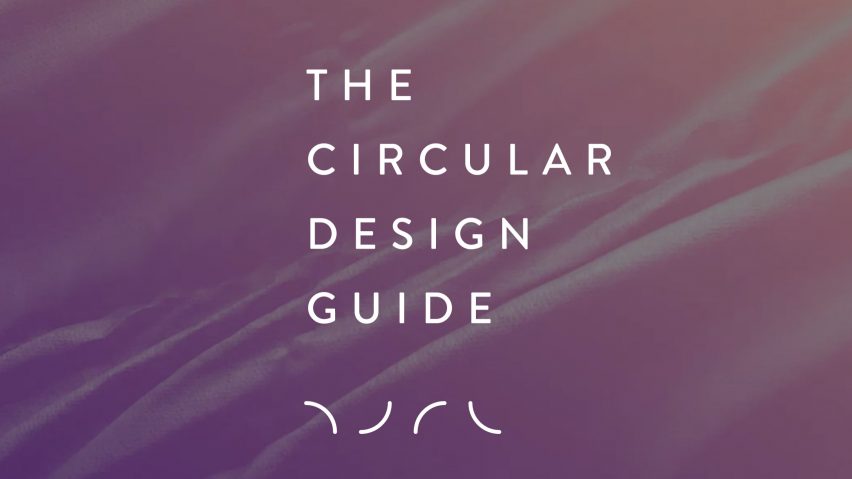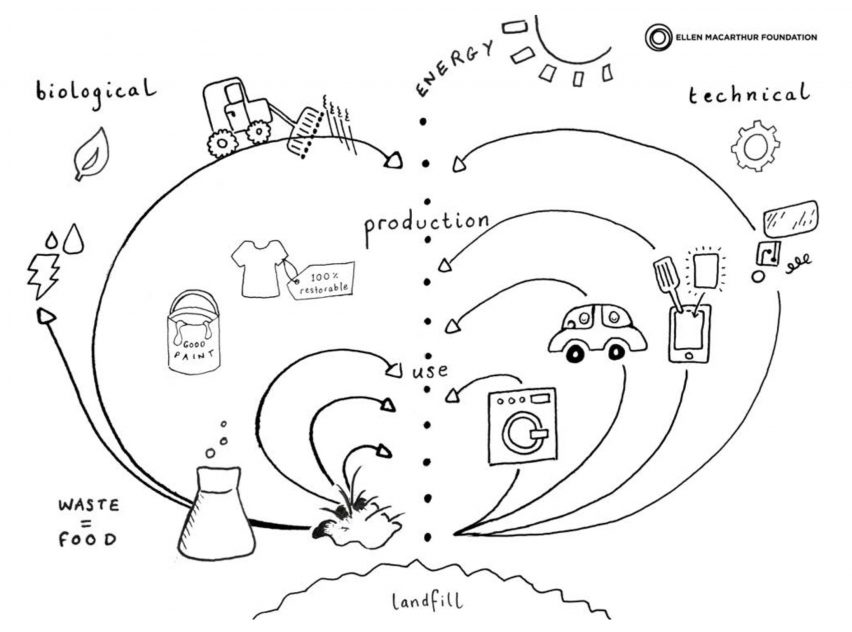
Guide to creating circular design launches at Davos
The Ellen MacArthur Foundation has teamed up with design and consulting firm IDEO to create a guide that helps businesses design for the circular economy.
Called The New Circular Design Guide, the online resource is aimed at "innovators, entrepreneurs and corporate change-makers" who want to better understand and implement circular innovations within everyday operations.
The guide was originally unveiled at the annual World Economic Forum in Davos 2017, and highlighted again at this year's event where the issue of plastic waste was high on the agenda.
"Design is integral in the shift to the circular economy," said Ellen MacArthur, former round-the-world yachtswoman and founder of the Ellen MacArthur Foundation – a UK-registered charity that aims to accelerate a transition to the circular economy.
"There's only so much we can do with products, services and systems based on the 'take, make, dispose' model," added MacArthur.
Moving on from the "take, make, dispose" model
According to the foundation, the circular economy concept offers an alternative to the existing and environmentally damaging linear economy.
In a circular economy resources are kept in use for as long as possible and then recovered and regenerated at the end of their service life. It aims to redefine growth, focusing on positive society-wide benefits.

Circular design refers to the creation of products and services that no longer have a life cycle with a beginning, middle and end. Therefore they contribute less waste and can actually add value to the ecosystem.
Produced in collaboration with IDEO, the guide is a "central, neutral resource on how to design for the circular economy," which was developed with input from leading businesses, specialist design institutions and more than 400 students.
The overall aim is to encourage businesses to examine the way they operate, and identify areas in which they can make their products and services more regenerative.
Guide offers "neutral resource on how to design for the circular economy"
The guide features 24 steps for implementing circular design divided into four categories – understand, define, make, and release – as well as video interviews with designers, worksheets, case studies and links to helpful technical tools.
Covering areas such as building teams, material selection and partnerships, the guide aims to tap into what the Ellen MacArthur Foundation believes is "an emerging business appetite for a restorative and regenerative approach".
Tim Brown, IDEO CEO, describes the circular economy as "one of the most important design challenges of our time"
"Transitioning to the circular economy is one of the most important design challenges of our time," said IDEO CEO Tim Brown.
"For designers, it means rethinking traditional approaches and retraining in circular principles. This guide was created to provide the tools needed to move from ideas to action, creating solutions for the circular economy that give businesses a competitive edge and are regenerative for our world."
Corporate giants commit to circular economy
At Davos, the Ellen MacArthur Foundation also announced the winners of its Plastics Economy Innovation Prize – a lucrative competition tasking designers to come up with new materials to replace plastic packaging.
With the goal of dramatically reducing the number of plastics that enter the ocean each year, the competition's five winners will each receive a $200,000 share of the $1 million prize. They will join a 12-month accelerator programme, run in collaboration with Think Beyond Plastic, to make the innovations marketable at scale.
"By re-thinking and re-designing, we can accelerate the transition to a new model that doesn’t just 'eke out resources a bit longer', but is restorative and regenerative by design," said MacArthur.
"It's a new driver for innovation, and across our global partners, CE100 network, New Plastics Economy initiative and beyond we're seeing organisations eager to embrace this new vision.
"With the Circular Design Guide, it's easier than ever to get started."
The Davos event also saw a host of corporate giants including Coca-Cola, Ecover, Evian, Amcor, Marks and Spencer, Wener & Mertz, L'Oréal, Mars, Walmart, PepsiCo and Unilever making commitments on their approach to packaging.
Supported by the Ellen MacArthur Foundation, the 11 companies, which together produce more than six million tonnes of plastic packaging each year, reaffirmed or announced pledges for 100 per cent reusable, recyclable or compostable packaging by 2025.
Commitment to tackling plastic pollution has been gaining momentum in recent years among global brands.
In 2016, sports brand Adidas teamed with environmental initiative Parley for the Oceans to create running shoes with uppers made using recycled plastic recovered from the sea.
While, last year IKEA unveiled its first kitchen cabinets to be made entirely from recycled plastic bottles and reclaimed industrial wood.